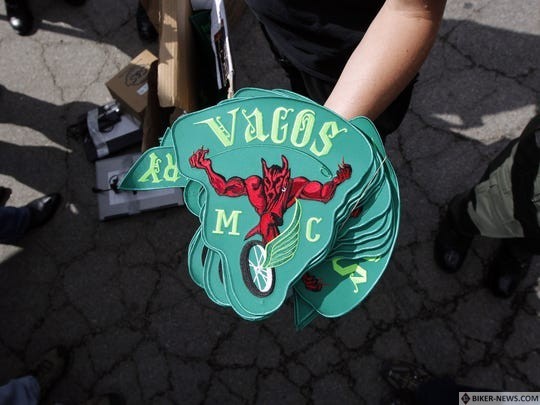LAS VEGAS (AP) – A federal prosecutor spent a second day Tuesday telling a jury in Las Vegas that eight accused Vagos MC members were members of a broad criminal racketeering enterprise responsible for crimes including the killing of a rival Hells Angels leader from California in a northern Nevada casino in 2011.
Assistant U.S. Attorney Daniel Schiess drew frequent objections from defense attorneys as he pointed jurors toward evidence that he said showed Vagos agreed according to “laws of the street, not laws of society” to commit years of acts of murder, robbery, extortion, kidnapping and drug dealing in addition to the shooting death of Jeffrey Pettigrew.
Vagos members “operate by violence and by silence,” Schiess said. “The silence is to protect the violence,” and crimes were committed “as a pattern in order to run the business.”
Closings were expected to continue this week, with defense attorneys poised for chances to describe a case they say the government has not proved.
The trial has had a bumpy history and narrowly avoided a mistrial after prosecutors asked U.S. District Judge Gloria Navarro to throw out testimony of a central witness to the shooting who acknowledged after more than three days on the witness stand that he lied.
The jury had been told during opening statements in August that they would hear from ousted Vagos member Gary “Jabbers” Rudnick about a “green light” go-ahead issued by Pastor Fausto Palafox, the Vagos international president, to kill Pettigrew at the Nugget casino in Sparks.
Rudnick admitted in September, after more than three days of testimony, that there was no “green light.”
The eight co-defendants – Palafox, Albert Lopez, Albert Perez, James Gillespie, Bradley Campos, Cesar Morales and Diego Garcia – each face up to life in prison if they are convicted.
When Schiess referred during closings to Rudnick’s testimony, defense attorney Mark Fleming objected and accused the prosecutor of vouching for his own disavowed witness.
Navarro said the jury will decide what and whom to believe.
“The decision about credibility of a witness is yours,” Schiess told the panel. “You get to decide whether he’s credible. That’s your call.”
Make Sure You are Subscribed to our Facebook page!
Source: Washington Times
